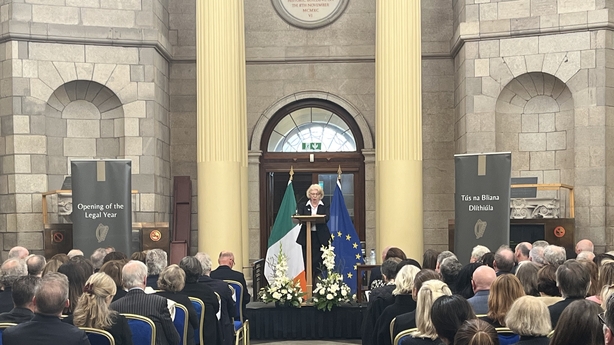The Chief Justice has said criticism of the courts and of individual judges should be fair and constructive.
Mr Justice Donal O'Donnell said such criticism should recognise the limitations on the information available about court cases and the significant constraints on courts and judges.
The Chief Justice was speaking at a ceremony to mark the opening of the new legal year.
It is only the second time that such a ceremony has been held in the Four Courts building in 100 years of the Irish courts system.
Previously, the opening of the new legal year was marked by religious ceremonies in nearby churches.
However, the Chief Justice said if there was to be a ceremony marking an important milestone in the justice system, it should take place in a public building "in circumstances which illustrate the essential equality of every person irrespective of their beliefs".
In his keynote address, Mr Justice O'Donnell said people were entitled to expect a determination made on the merits by a decision maker "solely by reference to facts and law".

He said when people are appointed judges, they must set aside their opinions and refrain from comment.
It was no part of the judicial function to try to manage public comment before a case or public reaction afterwards, he also added.
However, Judge O’Donnell outlined that due to the way the media industry has developed, and the increasing influence of social media, "the routine day-to-day reporting of court cases" has significantly decreased.
He said this mattered because the more experience and knowledge the public have of the legal system, the greater their confidence in it.
The Chief Justice noted that the system of government in which there are checks and balances providing for the limitation of legislative and executive powers by the courts is under challenge "at a level we have not witnessed before" and much of that challenge he said was directed towards the courts.
He said the challenge was made more dangerous, by the lack of "comprehensive, accurate information about court," a tendency to extrapolate from extreme instances and by the capacity for criticism to be amplified on social media and widely shared with those who have no experience of the courts.
Mr Justice O'Donnell said the courts have a critical role to play maintaining checks and balances on the State’s power and in maintaining people’s confidence in the State.
He also told the guests at this morning’s ceremony that the pace of change in society in the last twenty years had been "extraordinary and dramatic".
He said law and litigation were becoming more elaborate and complex and it was "urgent" to take the opportunity to examine the system with fresh eyes.
The judge pointed out that IT networks in courts across the country were at, or over capacity in most locations and that the fibre cabling in the Four Courts complex was between 20 and 25 years old and incapable of facilitating the high data speeds needed for modern day business activities.
He said significant and consistent investment was needed over the next decade to provide the physical infrastructure and modern digital services that an efficient court system required.
Mr Justice O'Donnell said the first phase of the appointment of additional judges by the Government had shown that there was a direct correlation between increased resources and increased output of work.
However, he said this also meant there needed to be investment in other parts of the legal system and the criminal justice system after a century of "persistent and consistent underinvestment" in the courts system.
He said there was now a "generational opportunity" to take a fresh look at the type of model of justice system the country wished to have - with speedy access to justice and fair decisions to all litigants.







